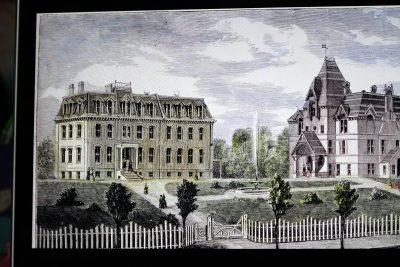The City of Boston observed Dr. Rebecca Lee Crumpler Day Monday, honoring the first Black woman to receive a medical degree in the United States.

Mayor Marty Walsh announced the day in a proclamation tweeted Sunday afternoon.
The city’s observance came on the 190th anniversary of Crumpler’s birth in 1831 in Delaware.
Crumpler, an alumna of the New England Female Medical College — which later merged with Boston University School of Medicine — became the first Black woman to receive a medical degree in the United States in 1864. She went on to publish the first medical book written by a Black physician in the country.
“She just lived a brave, courageous, trailblazing life,” said Melody McCloud, an obstetrician-gynecologist and the founder and medical director of Atlanta Women’s Health Care. “Now, many of us follow in her footsteps.”
McCloud said she first learned of Crumpler’s life and legacy after graduating from BUSM and moving to Atlanta in 1981. There, she discovered the now-defunct Rebecca Lee Society, a “support group for Black female physicians,” she said.
McCloud worked to install an exhibit in Crumpler’s name at BUSM — which was unveiled in 2016 — encouraged Governor Ralph Northam of Virginia to honor Crumpler for National Doctors Day in 2019 and assisted Friends of the Hyde Park Branch Library’s Vicky Gall in her gravestone project, which reached national attention via NBC Nightly News in July 2020.
BUSM is holding a weeklong, online symposium to celebrate Crumpler’s life, which began Monday and goes until Friday.
At the first event of the week — a Monday afternoon virtual lecture titled “Breaking Ground: Building a Different Future” — BUSM Dean Karen Antman said Crumpler was a “remarkable woman.”
“I can’t imagine how hard it was for a Black woman in medicine in the 1800s,” Antman said. “Even today, our women, particularly our Black women, are very aware of discrimination in medicine.”
Monday’s lecturer Joan Reede, dean for diversity and community partnership at Harvard Medical School, said at the event Crumpler was a “pioneer who used her power for good.”
“She was a Black woman who recognized her potential, took advantage of opportunities, dedicated her life to the well-being of others,” Reede said. “She was an explorer willing to chart a new course, one that had not previously been traveled.”
Crumpler was inspired to pursue medicine by her aunt, a caregiver who raised her, McCloud said.
Crumpler then moved to Charlestown in 1852, where she worked as a nurse. Crumpler was recommended to medical school by a Boston physician and Harriet Beecher Stowe, author of “Uncle Tom’s Cabin,” Antman said.
Crumpler matriculated at the New England Female Medical College in 1860 and graduated in 1864.
After the end of the Civil War, Crumpler moved to Richmond, Virginia, where she worked with the Freedmen’s Bureau to help recently freed, formerly enslaved people, McCloud said.
“I mean, my God, I thought I was brave leaving Boston to come to Atlanta in 1981,” McCloud said.
Crumpler faced racist and unequal treatment by her peers in Virginia’s medical industry. Hospitals denied her the ability to admit new patients, pharmacists refused to fill her patients’ prescriptions and some of her colleagues “said that the M.D. behind her name stood for ‘mule driver,’” McCloud said.
“She endured all that, she stayed in Virginia for three and a half years basically, living in tent camps, working in tent camps,” McCloud said. “It’s a remarkable story of courage, strength, commitment to the profession.”
McCloud said she shares similar experiences with Crumpler, such as an early childhood inspiration to pursue medicine from her family’s Black female pediatrician and becoming the first Black female physician to establish an OB-GYN practice in DeKalb County, Georgia and the third to do so in the city of Atlanta.
She noted that, nationwide, only five percent of physicians are Black — only about two percent are Black women.
“We’ve come a long way,” McCloud said, “but we still have a long way to go.”
Reede said diversity work has historically been treated as an “add-on” by the medical industry, and diversity is only sustainable when it is fundamental to an organization.
Celebrating diversity and firsts, like Crumpler, is the first step in the right direction, Reede said, but more is to be done.
“Firsts should be celebrated,” Reede said. “But we must remember that one is not enough. The door needs to be opened wider.”
CORRECTION: A previous version of the article included a photo of Mary Eliza Mahoney, the first Black woman to graduate from an American school of nursing. The article has been updated to correct this, although no photos of Rebecca Lee Crumpler are known to exist.























































































































Victoria Gall • Feb 9, 2021 at 5:51 am
There is no image of Dr. Rebecca Lee Crumpler. The photo above is of Mary Elisa Mahoney, the first professionally trained Black nurse (1879). It is often mistakenly used .Thanks for spreading the word about Dr. Crumpler’s accomplishments.